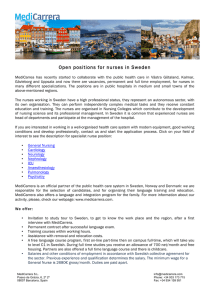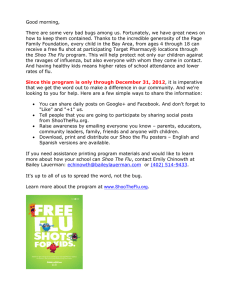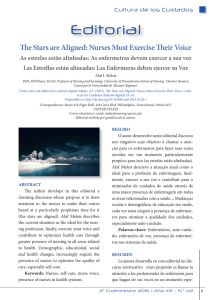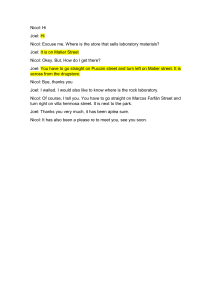It`s All About Leadership
Anuncio
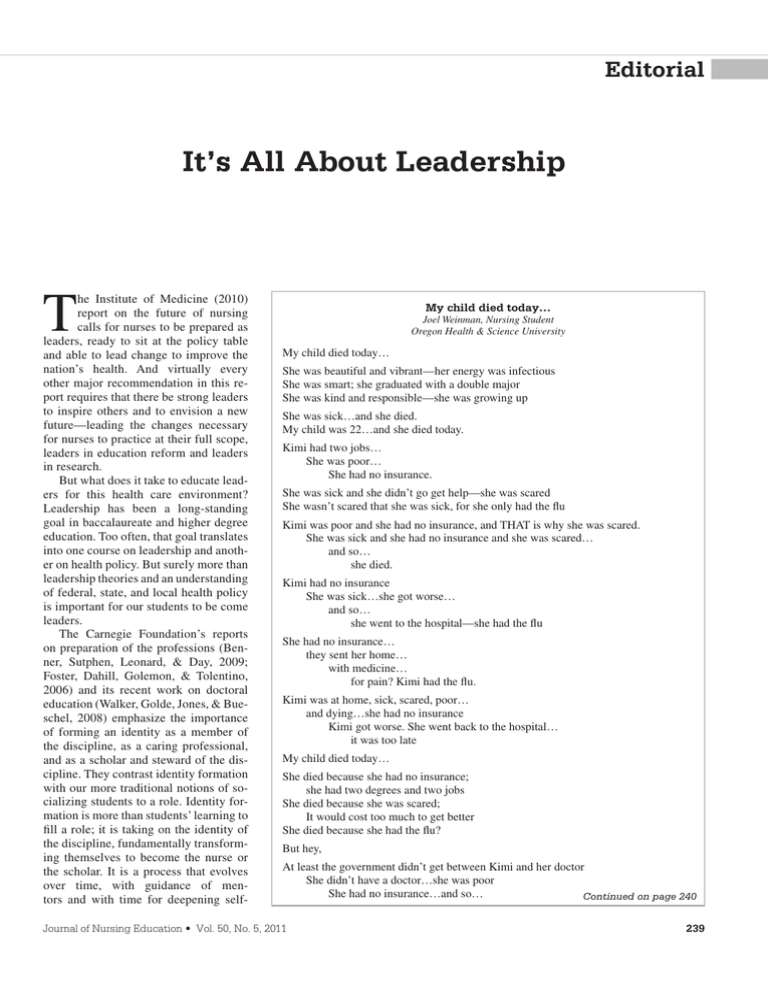
Editorial It’s All About Leadership T he Institute of Medicine (2010) report on the future of nursing calls for nurses to be prepared as leaders, ready to sit at the policy table and able to lead change to improve the nation’s health. And virtually every other major recommendation in this report requires that there be strong leaders to inspire others and to envision a new future—leading the changes necessary for nurses to practice at their full scope, leaders in education reform and leaders in research. But what does it take to educate leaders for this health care environment? Leadership has been a long-standing goal in baccalaureate and higher degree education. Too often, that goal translates into one course on leadership and another on health policy. But surely more than leadership theories and an understanding of federal, state, and local health policy is important for our students to be come leaders. The Carnegie Foundation’s reports on preparation of the professions (Benner, Sutphen, Leonard, & Day, 2009; Foster, Dahill, Golemon, & Tolentino, 2006) and its recent work on doctoral education (Walker, Golde, Jones, & Bueschel, 2008) emphasize the importance of forming an identity as a member of the discipline, as a caring professional, and as a scholar and steward of the discipline. They contrast identity formation with our more traditional notions of socializing students to a role. Identity formation is more than students’ learning to fill a role; it is taking on the identity of the discipline, fundamentally transforming themselves to become the nurse or the scholar. It is a process that evolves over time, with guidance of mentors and with time for deepening self- My child died today… Joel Weinman, Nursing Student Oregon Health & Science University My child died today… She was beautiful and vibrant—her energy was infectious She was smart; she graduated with a double major She was kind and responsible—she was growing up She was sick…and she died. My child was 22…and she died today. Kimi had two jobs… She was poor… She had no insurance. She was sick and she didn’t go get help—she was scared She wasn’t scared that she was sick, for she only had the flu Kimi was poor and she had no insurance, and THAT is why she was scared. She was sick and she had no insurance and she was scared… and so… she died. Kimi had no insurance She was sick…she got worse… and so… she went to the hospital—she had the flu She had no insurance… they sent her home… with medicine… for pain? Kimi had the flu. Kimi was at home, sick, scared, poor… and dying…she had no insurance Kimi got worse. She went back to the hospital… it was too late My child died today… She died because she had no insurance; she had two degrees and two jobs She died because she was scared; It would cost too much to get better She died because she had the flu? But hey, At least the government didn’t get between Kimi and her doctor She didn’t have a doctor…she was poor She had no insurance…and so… Continued on page 240 Journal of Nursing Education • Vol. 50, No. 5, 2011 239 Editorial Continued from page 239 She died Every year, in the richest country in the world 40,000 people die Because they are poor Because they have no insurance They were scared too. Every month, in this richest country in the world, a 9/11 occurs The towers of the disadvantaged, the poor, and the un-insured—they fall They stood strong and tall like my Kimi, but… The powerful planes plow through them with the full force of opposition… opposition to a fair and just world, opposition to compassion as Christ championed opposition to equality…and care…for everyone. Those planes tear down and destroy: 3500 souls every month, 111 lives every day, 5 human beings every hour…In the richest country in the world Those wings of death and destruction are piloted by politicians fighting to keep healthcare a commodity not a right nor a gift nor an expectation No, In the richest country in the world, money is to be made off the sick… In the richest country in the world, providing care for the ill is an avenue for profit… In the richest country in the world, politicians bought with blood money fight to keep the status quo… In the richest country in the world, one man can make 100 million dollars a year. All he has to do is deny promises to those who have paid for them. All he has to do is deny care to those that have paid for it And, of course, he must make sure that the laws in the richest country in the world… allow him to continue to do so…again, and again, and again… These men and his pilots; they are cowards. They are not nearly as brave as a suicidal terrorist. They kill from afar. They kill by remote control. But they kill nonetheless, 40,000 human souls, every single year… In the richest country in the world My Kimi was but one of those 40,000 But she was mine…she was my child She was sick She was poor She had no insurance. She was sick and she was poor and she had no insurance and she was scared She had the flu…and she died Kimi was a victim of the terrorism of ignorance and greed. Kimi died today…from the flu… Kimi was 22, Kimi was my child, Kimi had the flu… And she died. 240 understanding, identifying the gifts that our students bring and how these gifts can be put in service of the discipline. Our students at all levels of education must be supported in the development of their identity as leaders. Nurses at every level serve important interpretive and advocacy functions. As members of the largest (and most trusted) health profession, nurses have a vital role in translating proposed legislation to the public. Think of the influence nurses could have had in the recent health care reform debate—in helping the public understand that government already has a substantial role in health care through Medicare and Medicaid programs, that the strong Veterans’ Administration health care system is socialized medicine, and that what has been divisively called a “death panel” is actually simply a provision for reimbursement for providers to discuss end-of-life care with patients and their families. Nurses are witness to the effects of health care policy on the lives of people and can engage in the formulation of new policy informed by this understanding. There are many qualities of leadership—honesty, passion, inspiration, vision are among them—and central to these qualities is the ability to serve as translator between health care policy and the lives of individual people. This interpretive practice must be central to every nurse’s education. In the Sidebar, I share a poem written by one of our senior students that clearly illustrates the interpretive skill, passion, and vision central to good leadership. The student, Joel Weinman, is a senior in our accelerated baccalaureate program, and will graduate in August 2011. I extend my deepest appreciation to Professor Sheila Kodadek, a great teacher, for her work with our students and for bringing this particular piece to my attention. Joel explains his poem: This poem is about one case of one person who died, presumably from the H1N1 virus, during the heated debates of 2009 that were taking place nationwide about health care reform. This woman died essentially because she contracted the flu, didn’t have insurance, and didn’t seek treatment because she was scared of the costs. She was young and healthy, and if she sought treatment Copyright © SLACK Incorporated Editorial soon enough, it is likely she would not have died. I remembered this story because it was so sad and it didn’t need to occur. With continued leadership in the area of nationalized or affordable health care in [the United States], hopefully our country will not have needless deaths from illnesses that can be prevented or treated if attended to early enough. to think about the topic and the policies surrounding it). Whether I made a difference through my words, I do not know. But I knew I could not stay silent on this topic as I felt so strongly against the status quo. To stay silent would have been to acquiesce to that status quo I feel so strongly against. To stay silent would have been to allow those in power to control my own personal power. To stay silent was unacceptable to me as silence equals collusion. It was the leadership of the movement that encouraged and empowered me to speak up on this issue of national importance. Joel was inspired by the need to inform in order to transform. He got active, as he describes: I spoke to parents at my daughter’s school; I spoke to very conservative coworkers who obviously had a very different view than mine; I carefully facilitated conversations with the youth that were in my charge when I worked as a youth work crew crewleader (I wanted to make sure I didn’t force my opinion upon them, but rather encouraged them I suspect this has been a transformative experience for Joel, and through it, he has become a leader. What are your students doing? What can you put in their path that will help them find their voice, speak their passions, and lead for change? Journal of Nursing Education • Vol. 50, No. 5, 2011 ReferenceS Benner, P., Sutphen, M., Leonard, V., & Day, L. (2009). Educating nurses: A call for radical transformation. San Francisco, CA: JosseyBass. Foster, C.R., Dahill, L., Golemon, L., & Tolentino, B.S. (2006). Educating clergy: Teaching practices and pastoral imagination. San Francisco, CA: Jossey-Bass. Institute of Medicine. (2010). The future of nursing: Leading change, advancing health. Washington, DC: National Academies Press. Walker, G.E., Golde, C.M., Jones, L., & Bueschel, A.C. (2008). The formation of scholars: Rethinking doctoral education for the 21st century. San Francisco, CA: Jossey-Bass. Christine A. Tanner, PhD, RN, FAAN Joel Weinman, Nursing Student Oregon Health & Science University School of Nursing The authors have no financial or proprietary interest in the materials presented herein. doi:10.3928/01484834-20110419-01 241
